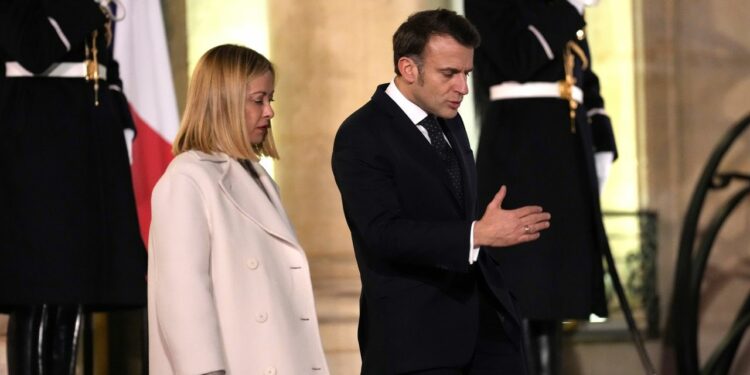French President Emmanuel Macron, center left, walks with Italy’s Prime Minister Giorgia Meloni, center right, as she leaves the Elysee Palace, after an informal meeting of leaders from key European Union nations and the United Kingdom, in Paris, Monday, Feb. 17, 2025. Credit: AP/Aurelien Morissard
“The U.K. is unique in that it’s practically the only major ally that Trump hasn’t purposefully antagonized since his inauguration,” said Anand Sundar, a special advisor at the European Council on Foreign Relations. “The Starmer government is doing everything it can to not put a target on its back.”
Some analysts suggest Starmer is positioning himself as Trump’s European ‘whisperer,’ able to influence the White House while staying in step with Europe.
Italy – Meloni’s balancing act
Giorgia Meloni, a Trump ally and the only leader of a major European economy to attend his inauguration in January, arrived late to the Paris summit and left without making a public statement — moves observers saw as signs of skepticism toward the meeting.
According to Italian news agency ANSA, Meloni questioned why the summit was held in Paris rather than Brussels, the EU’s natural decision-making hub, and criticized the exclusion of frontline states such as the Baltic nations, Sweden, and Finland.
At the summit, she pushed back against deploying European troops to Ukraine, calling it “the most complex and least effective option” – especially without firm security guarantees for Kyiv.
Observers noted that Meloni echoed some of U.S. Vice President JD Vance’s criticism of Europe’s reliance on U.S. protection. “We shouldn’t be asking what the Americans can do for us, but what we must do for ourselves,” she said, according to ANSA.
Despite her skepticism, Meloni still engaged in the talks, bringing Italy’s concerns over long-term European military commitments to the table.
Hungary – Orban’s absence
Notably absent from the Paris talks was Hungarian Prime Minister Viktor Orbán, a close Trump ally and frequent critic of EU policies.
While no official reason was given for his exclusion, some observers saw it as a pointed message from Paris and its European allies about the limits of engagement with leaders seen as too closely aligned with Trump’s worldview.
Germany – Scholz’s irritation
If Macron is stepping forward, Scholz is pushing back.
At the summit, the German Chancellor rejected Macron’s proposal for a European-led security force in Ukraine, calling it “completely premature” and “highly inappropriate” given the ongoing war.
Scholz didn’t hide his frustration, saying he was “a little irritated” that peacekeeping forces were even being discussed “at the wrong time.” He insisted NATO — not an independent European force — must remain the foundation of security.
Due to its historical legacy from the world wars, some argue that Germany has always been willing to cede European security leadership to France, a role the French have pursued since President Charles de Gaulle.
At the same time, the debate over military spending is intensifying, as NATO officials stress the alliance’s 2% GDP target is now a baseline rather than a cap.
Source link : http://www.bing.com/news/apiclick.aspx?ref=FexRss&aid=&tid=67b4ce8489e34eef804d1eba31003e8d&url=https%3A%2F%2Fwww.newsday.com%2Fnews%2Fnation%2Feurope-ukraine-security-summit-trump-f34079&c=8901265479885806097&mkt=de-de
Author :
Publish date : 2025-02-18 08:29:00
Copyright for syndicated content belongs to the linked Source.


